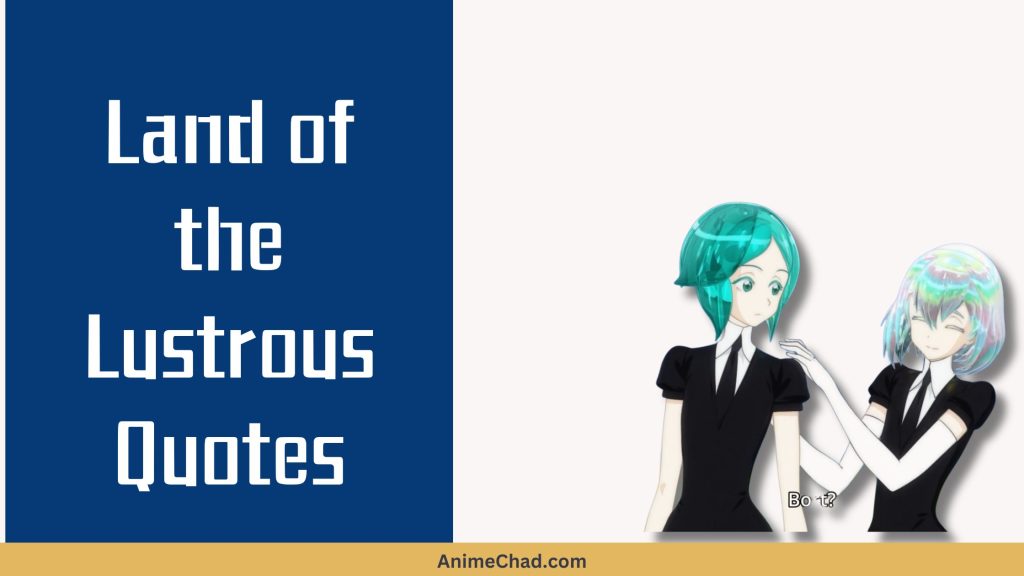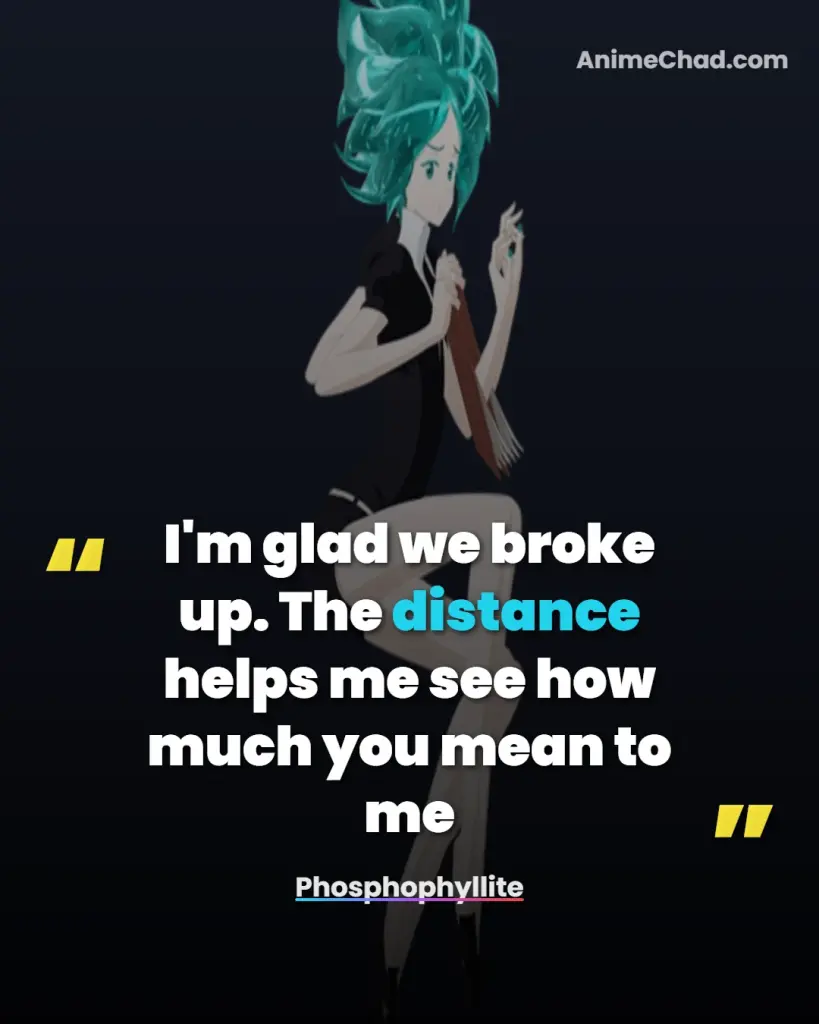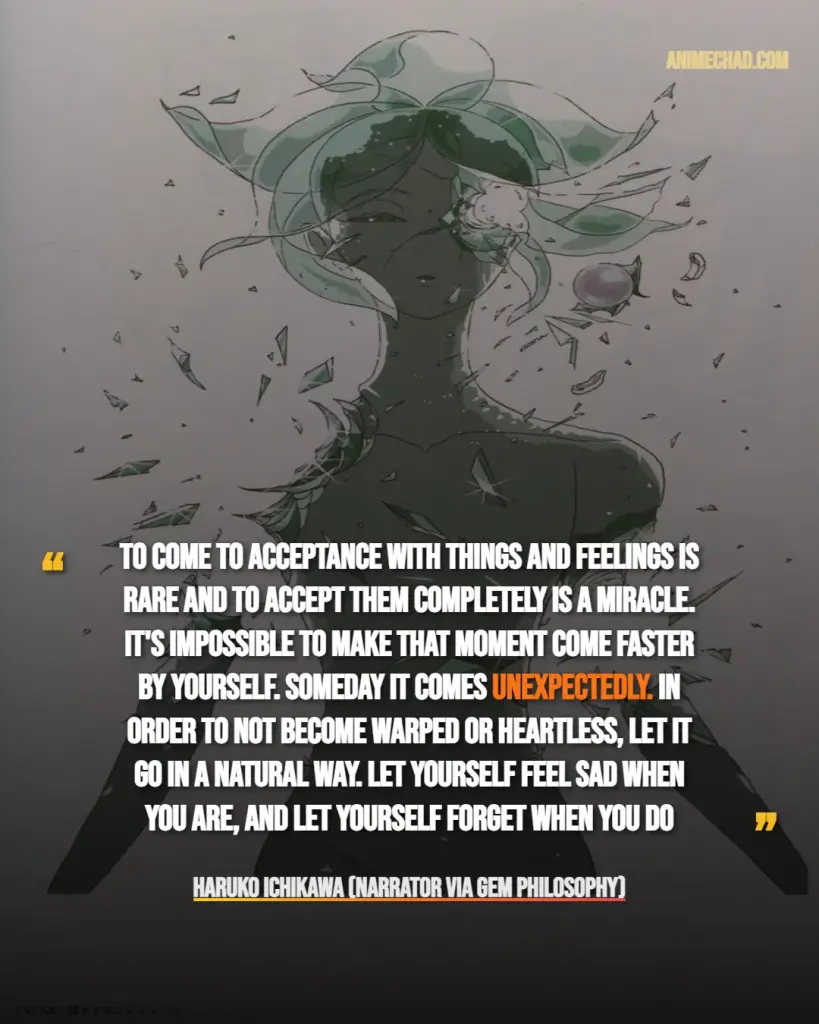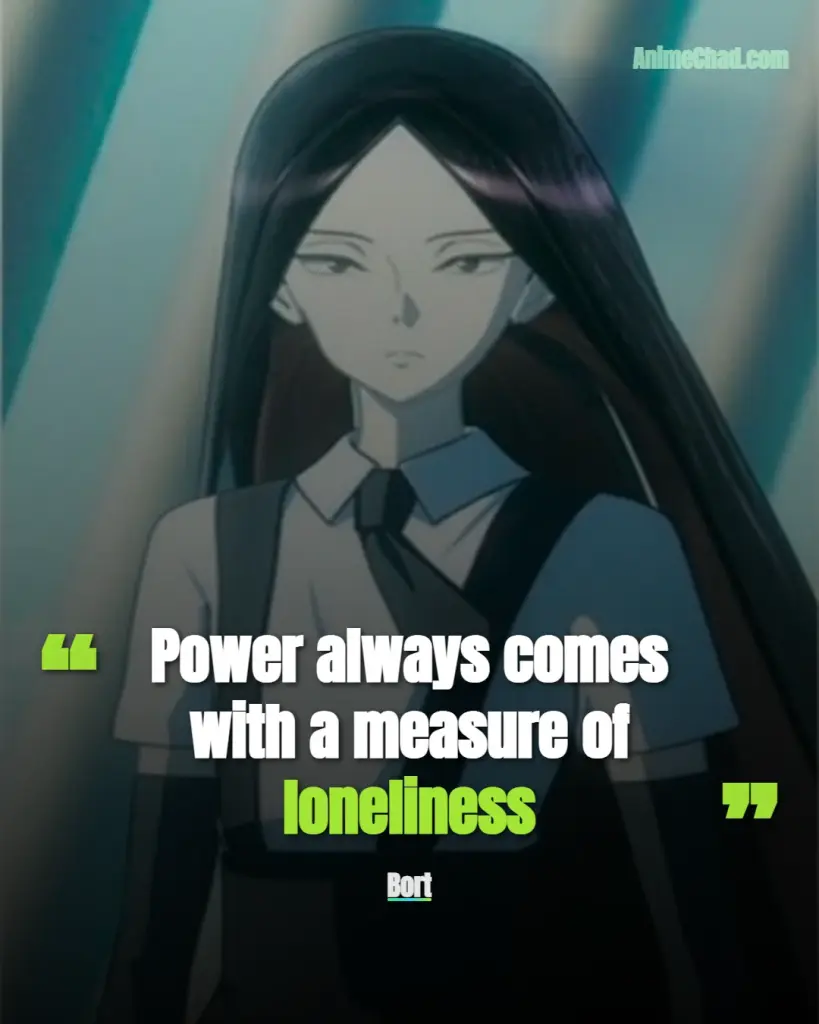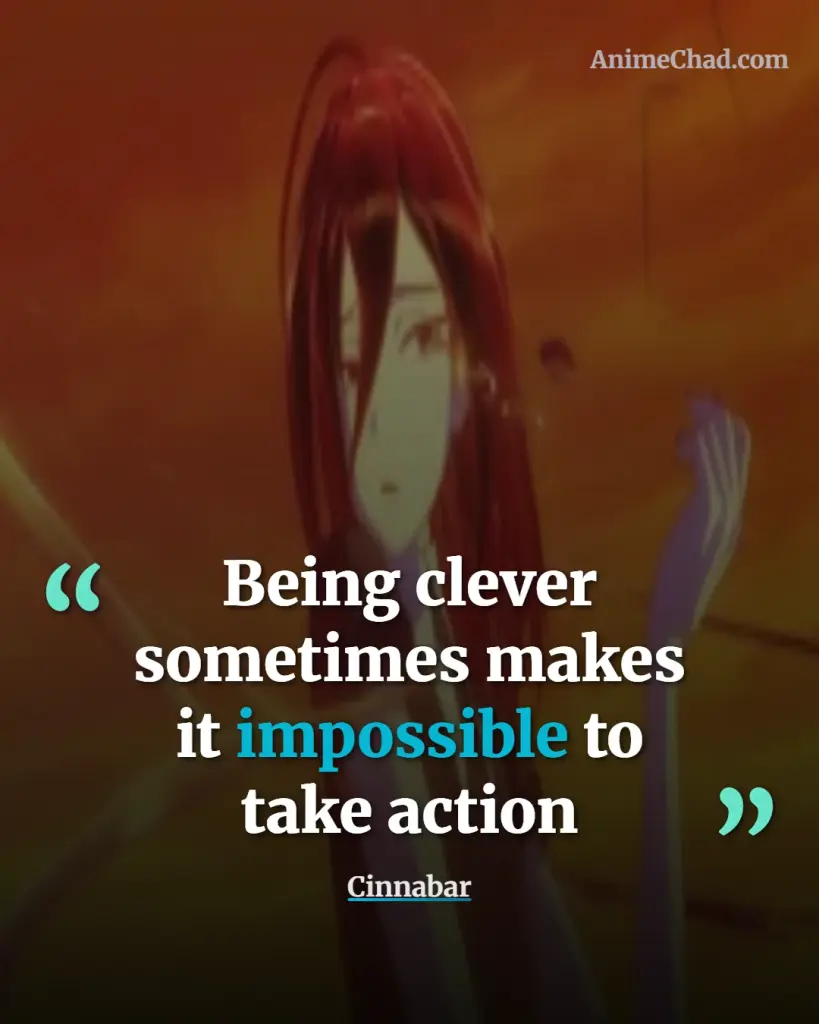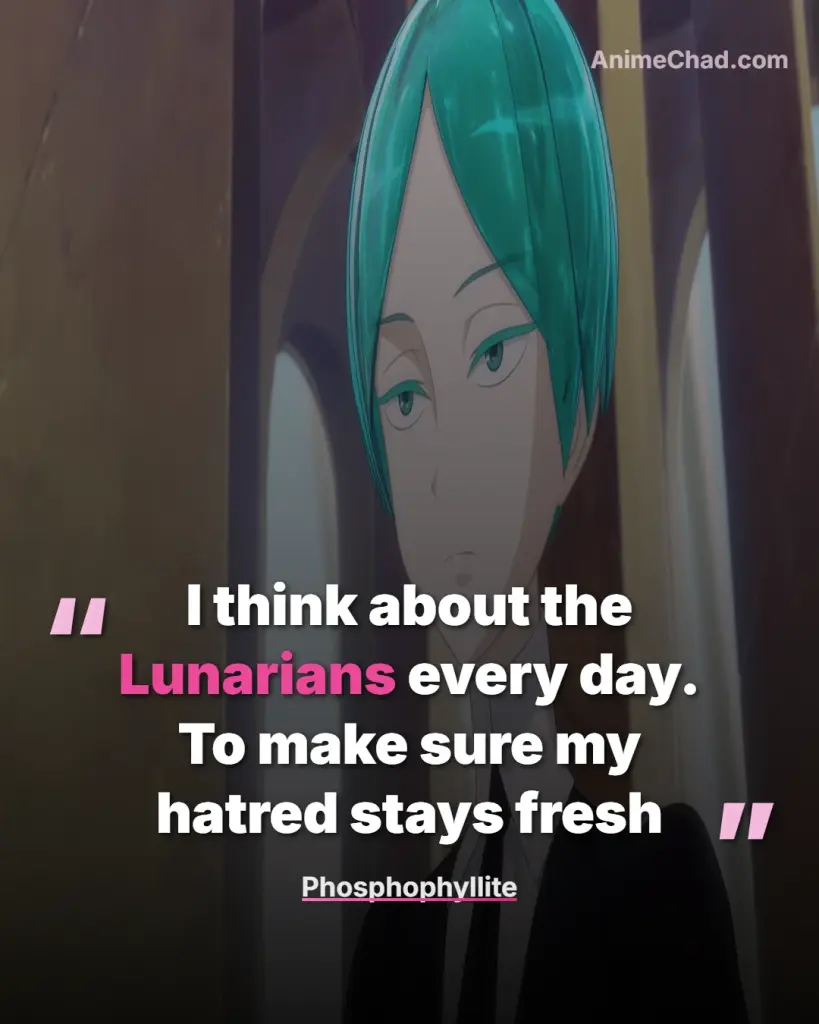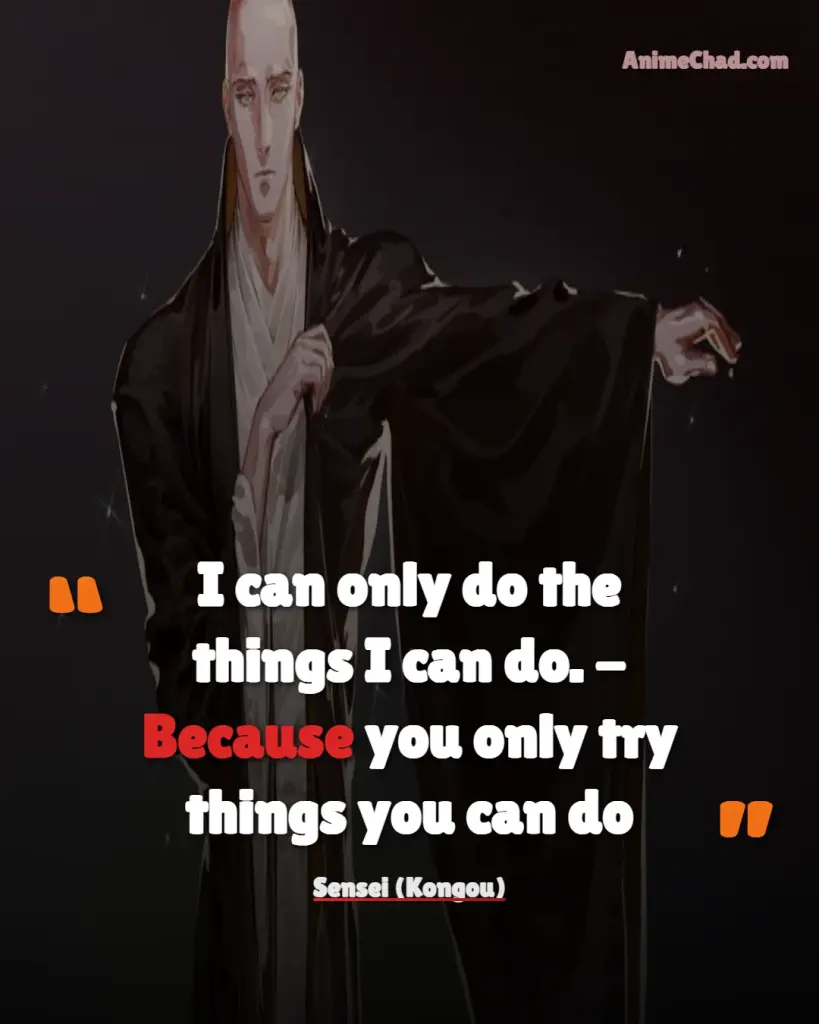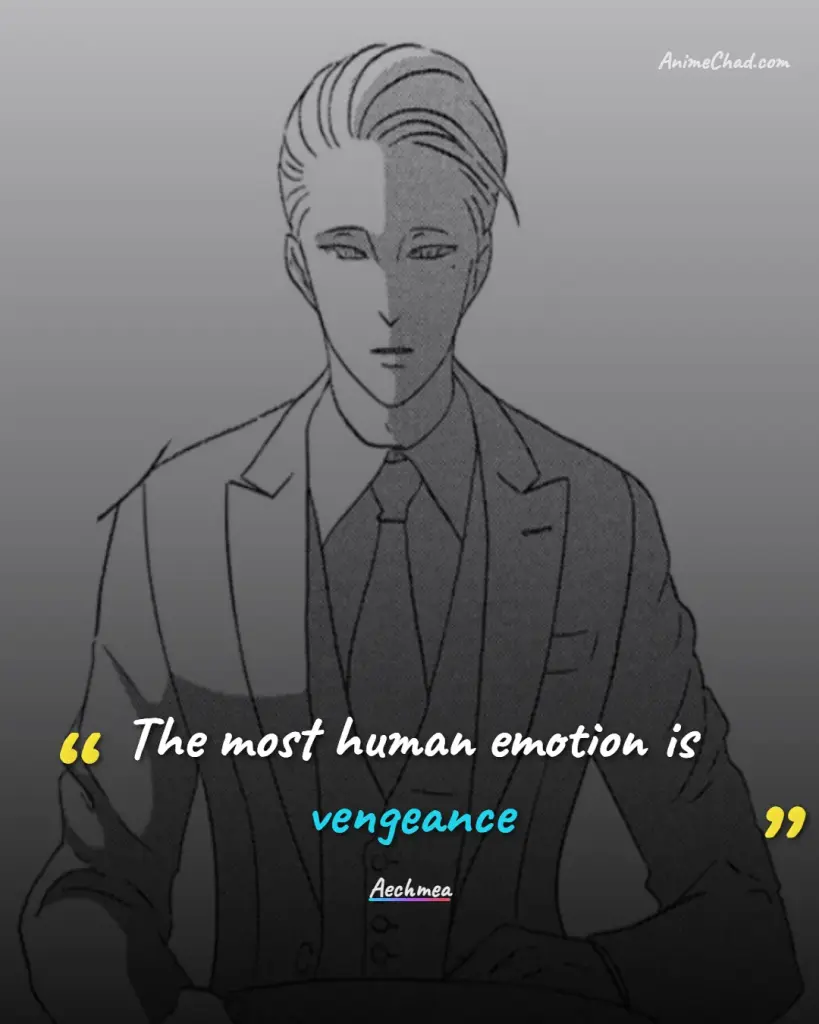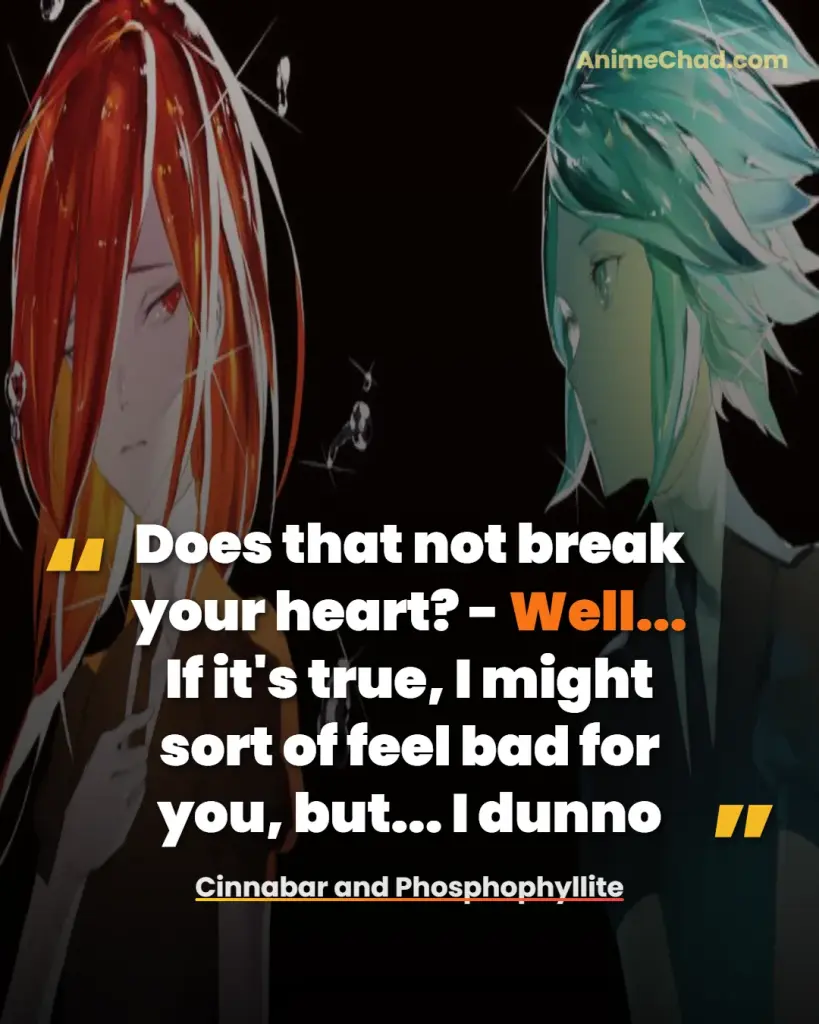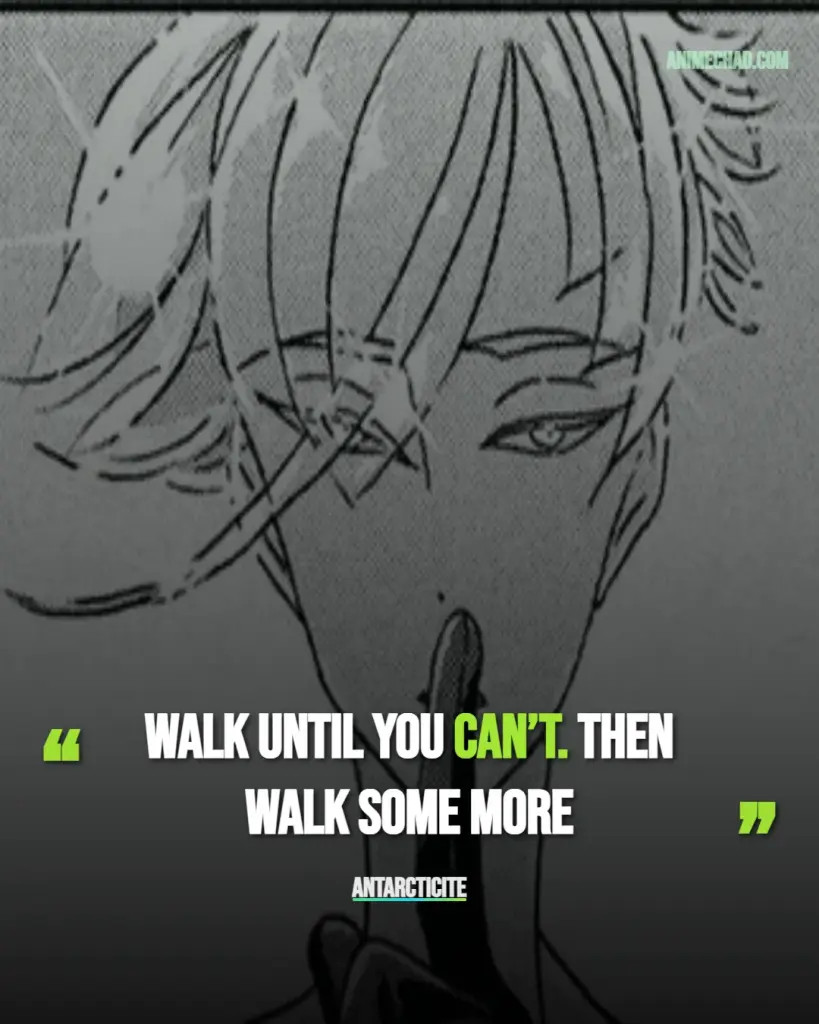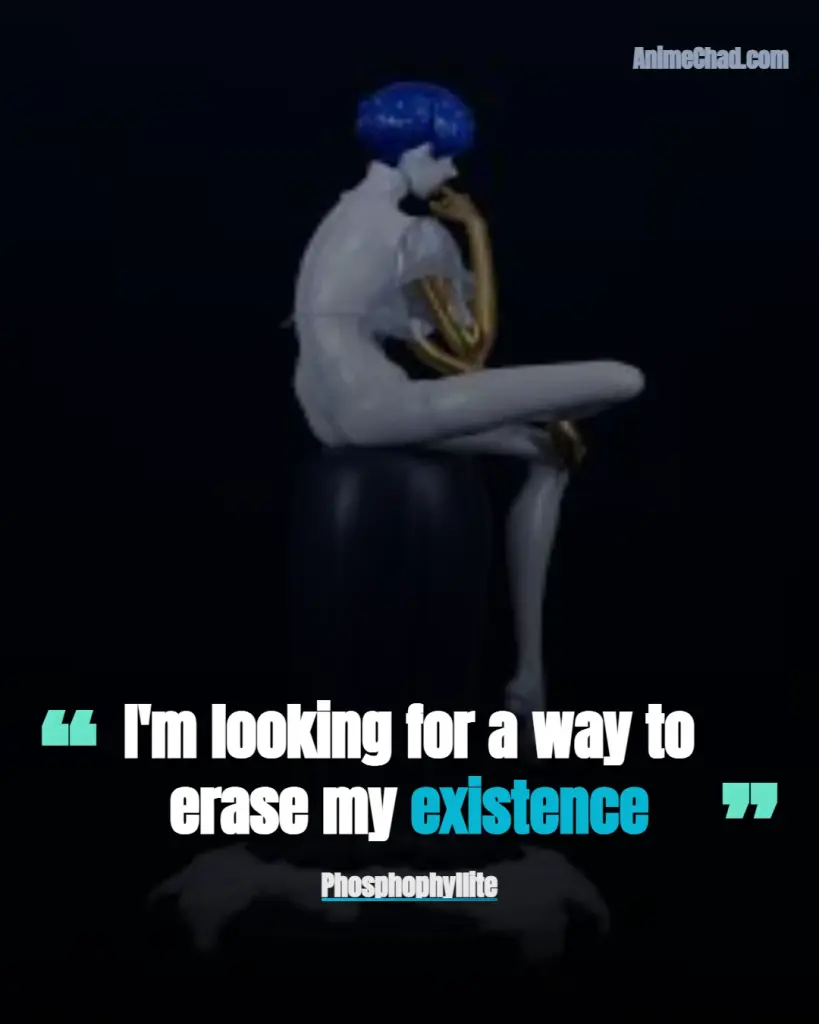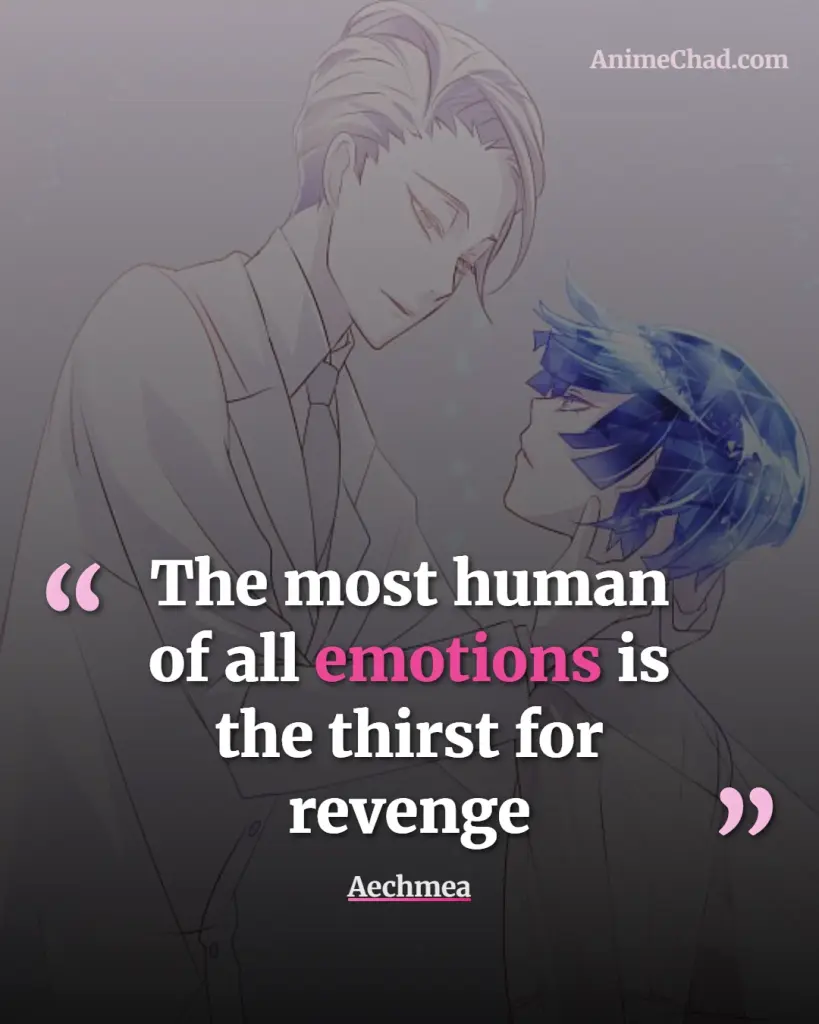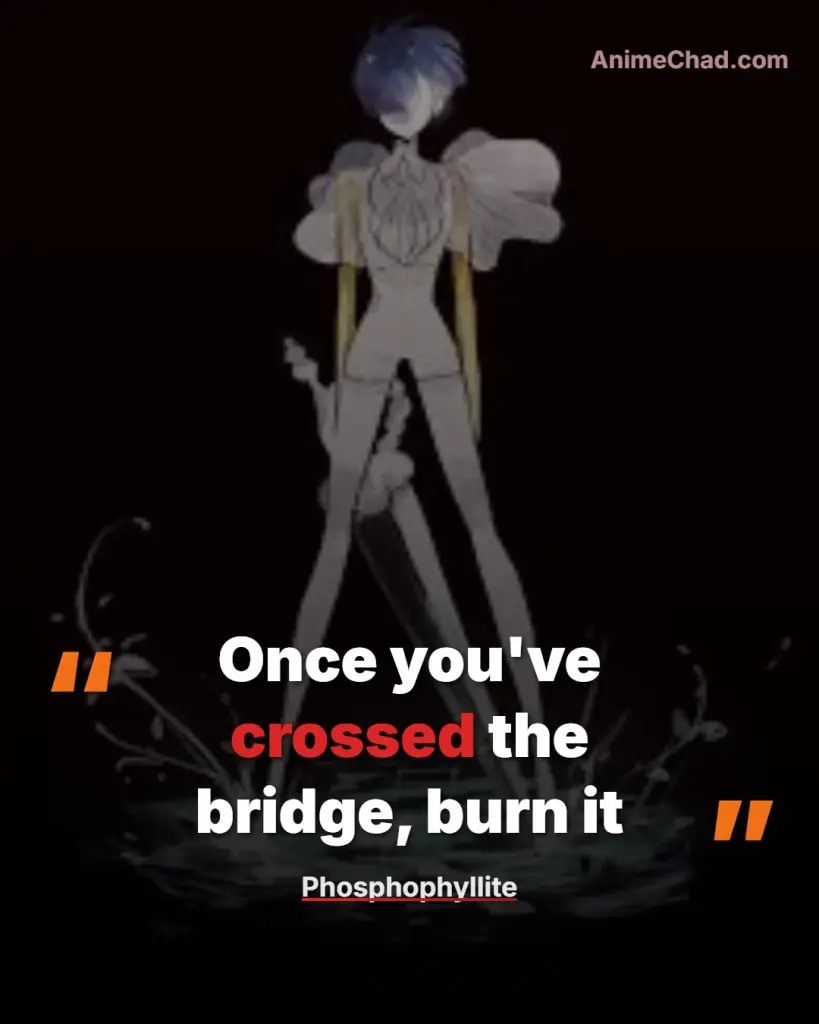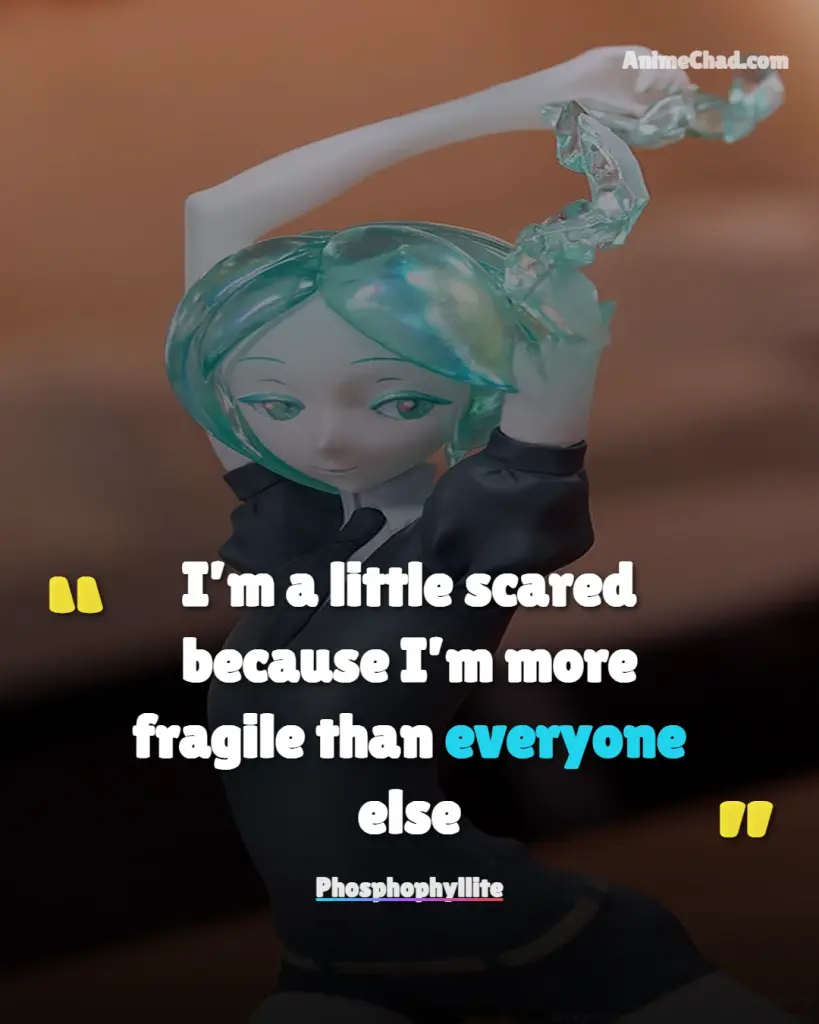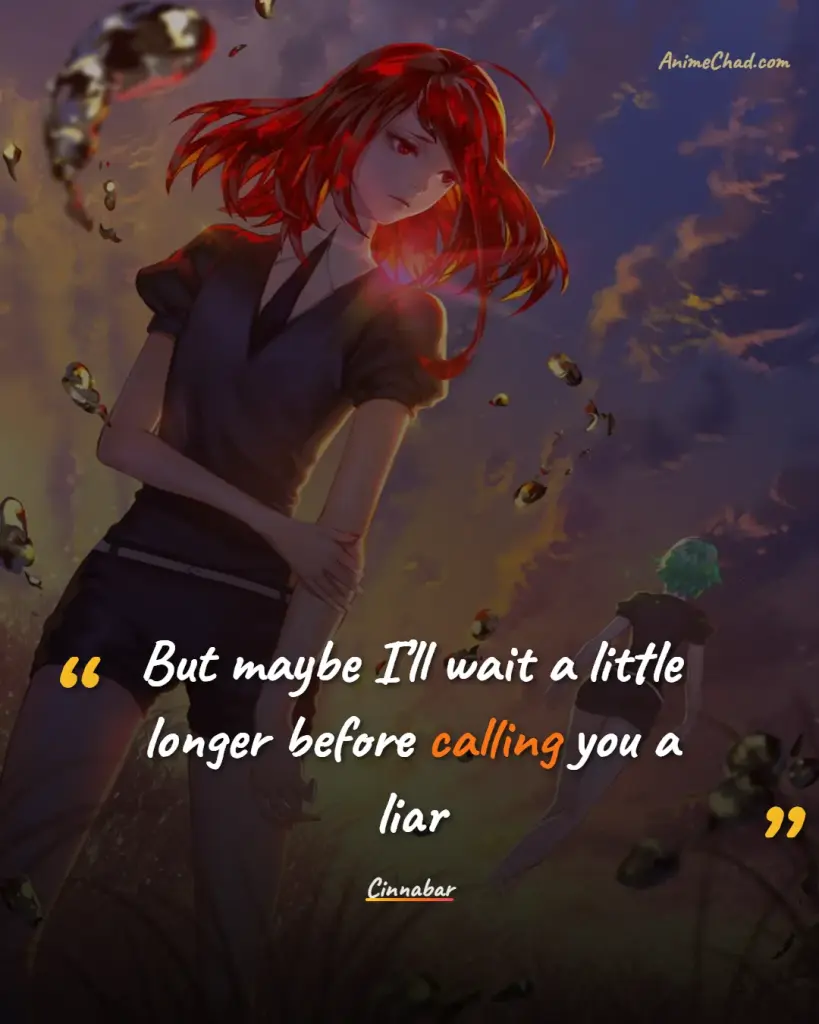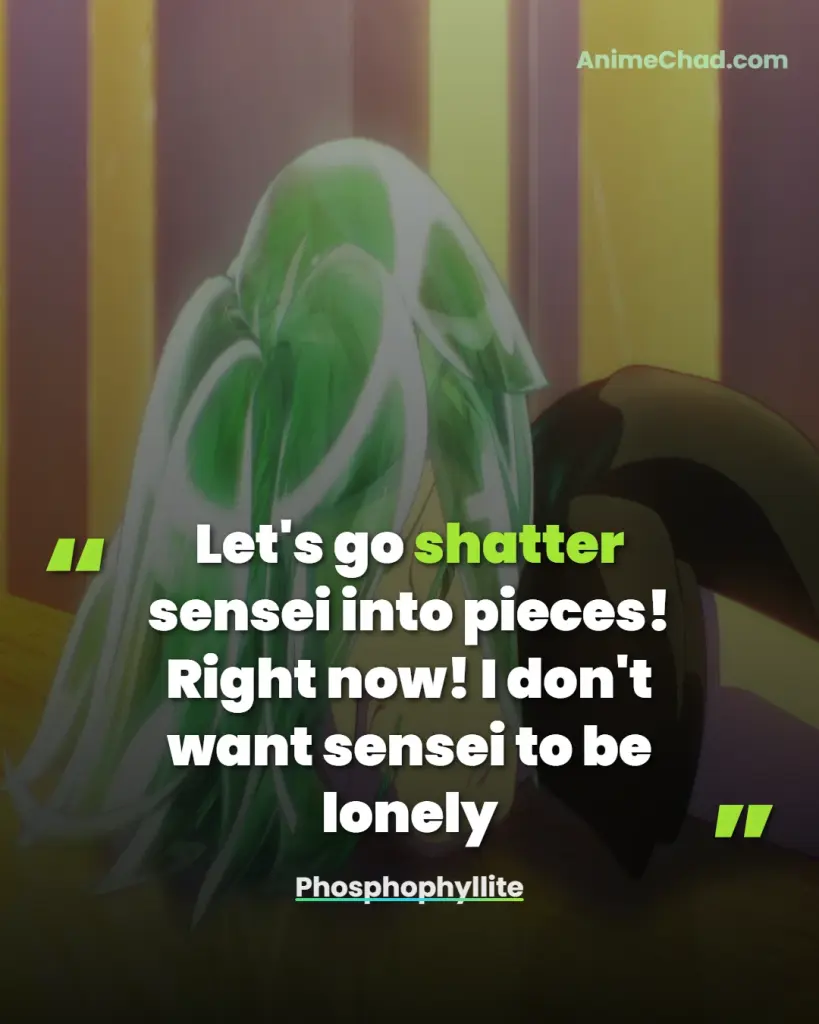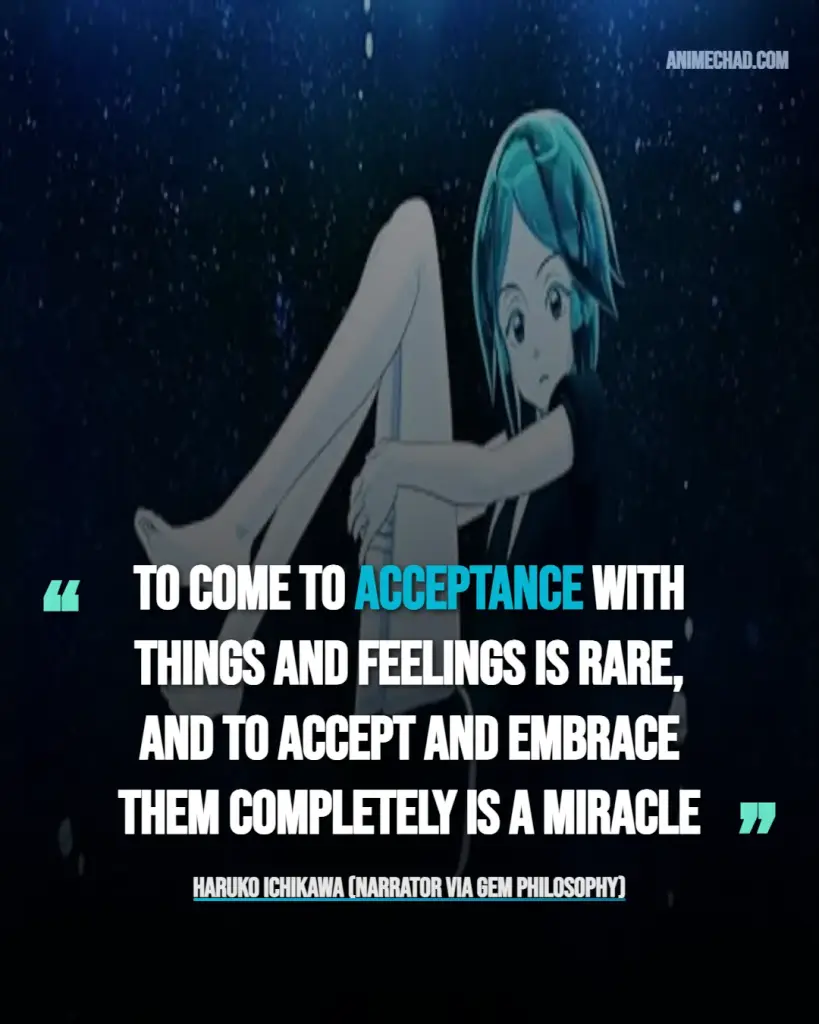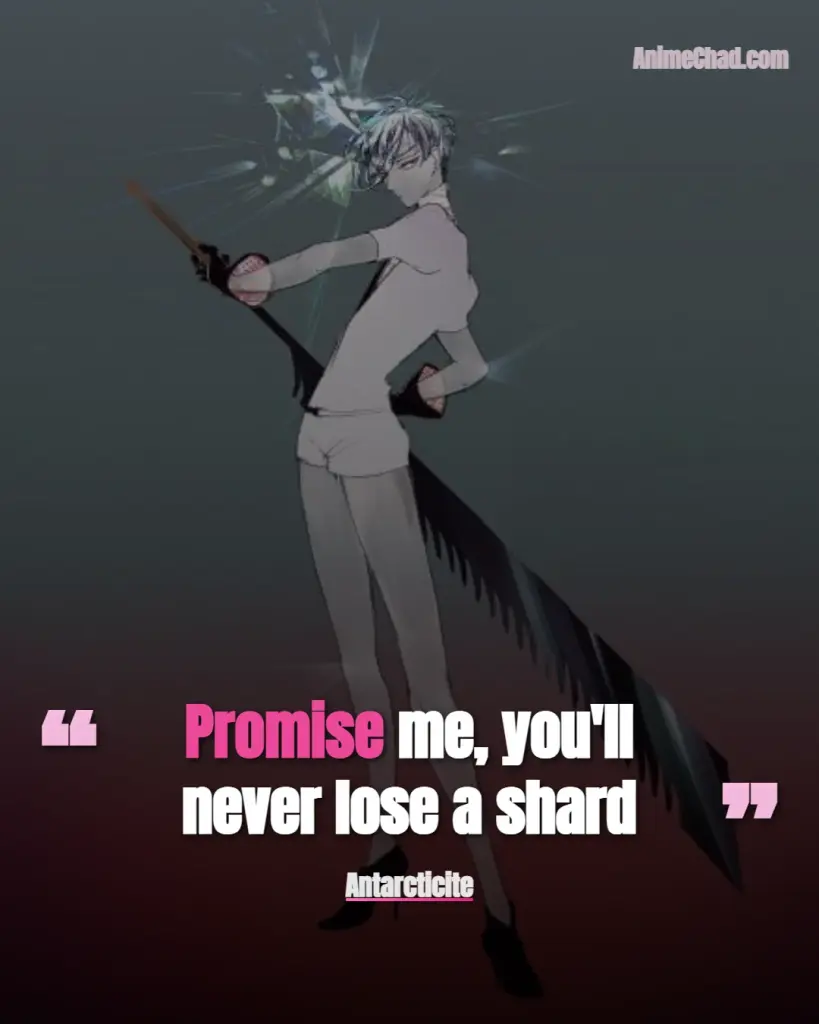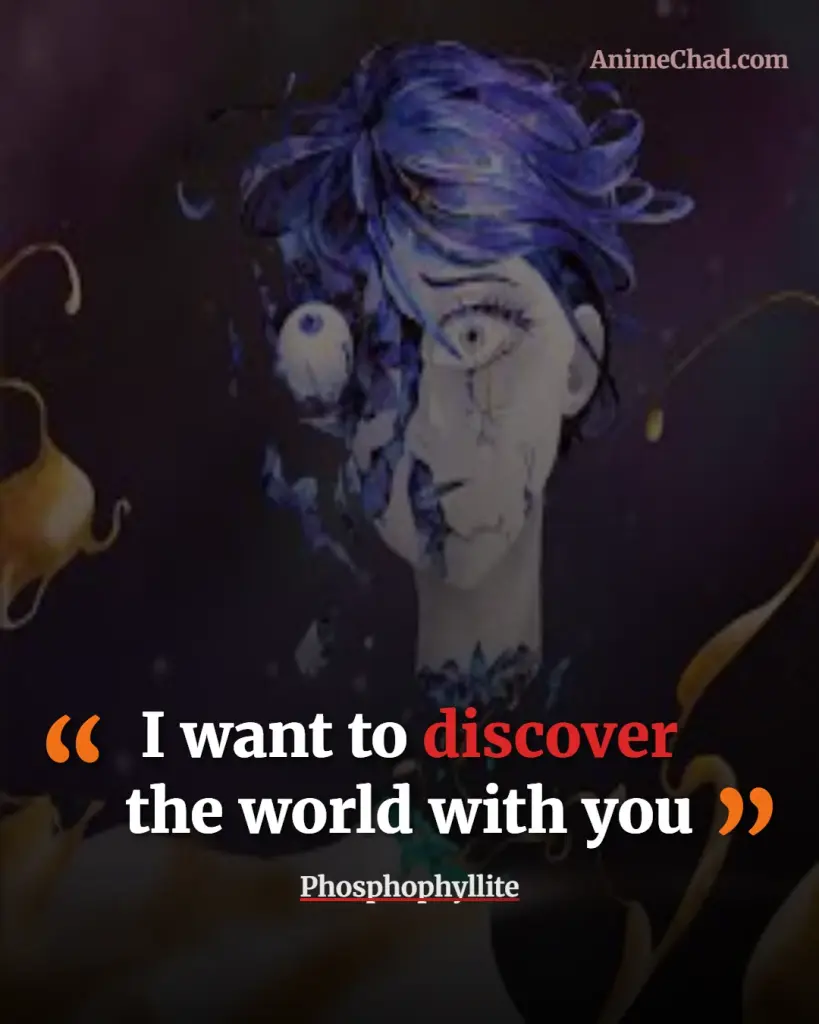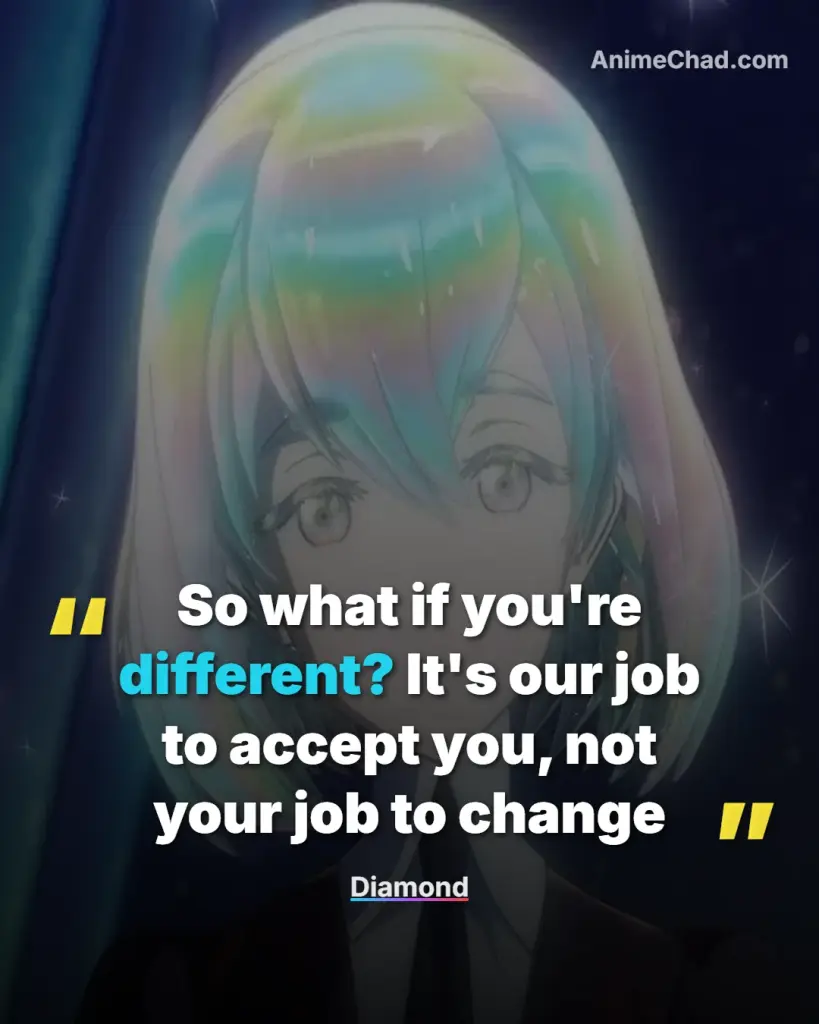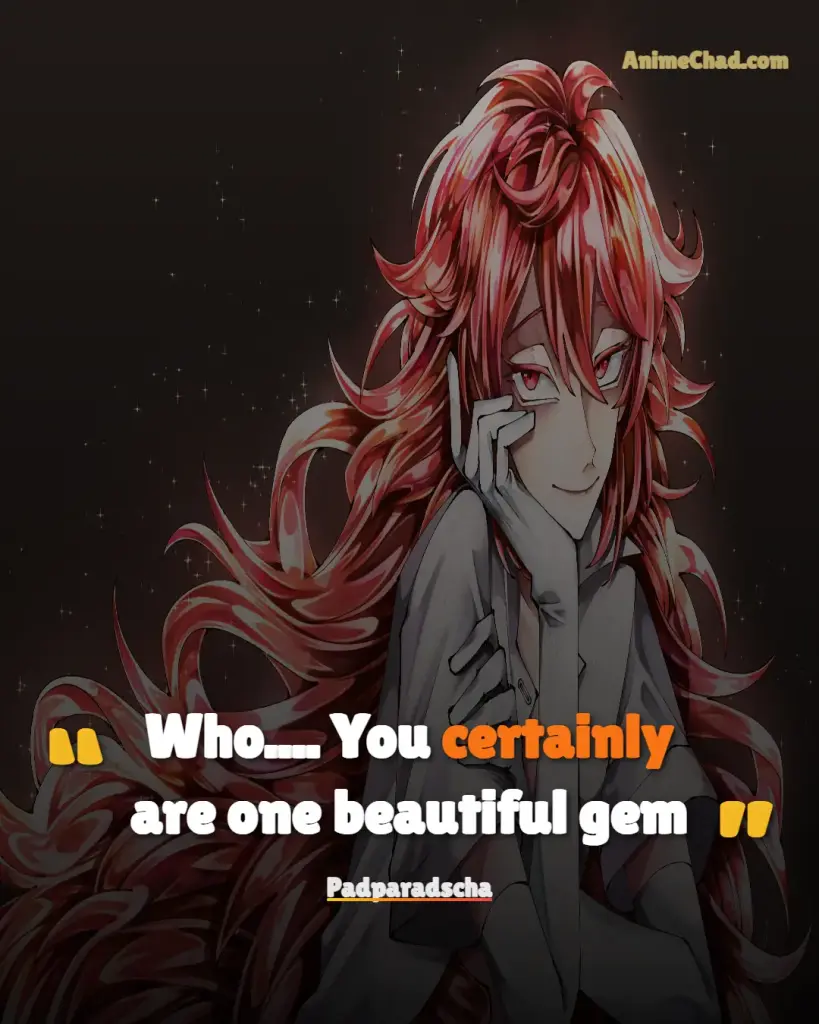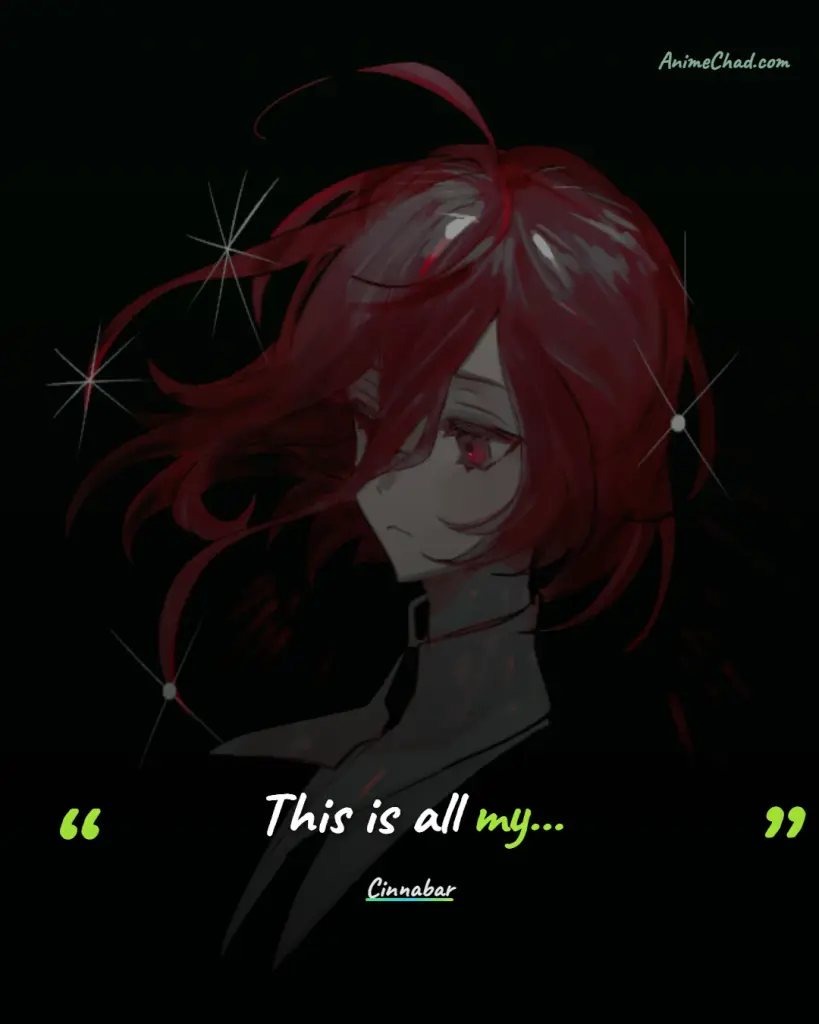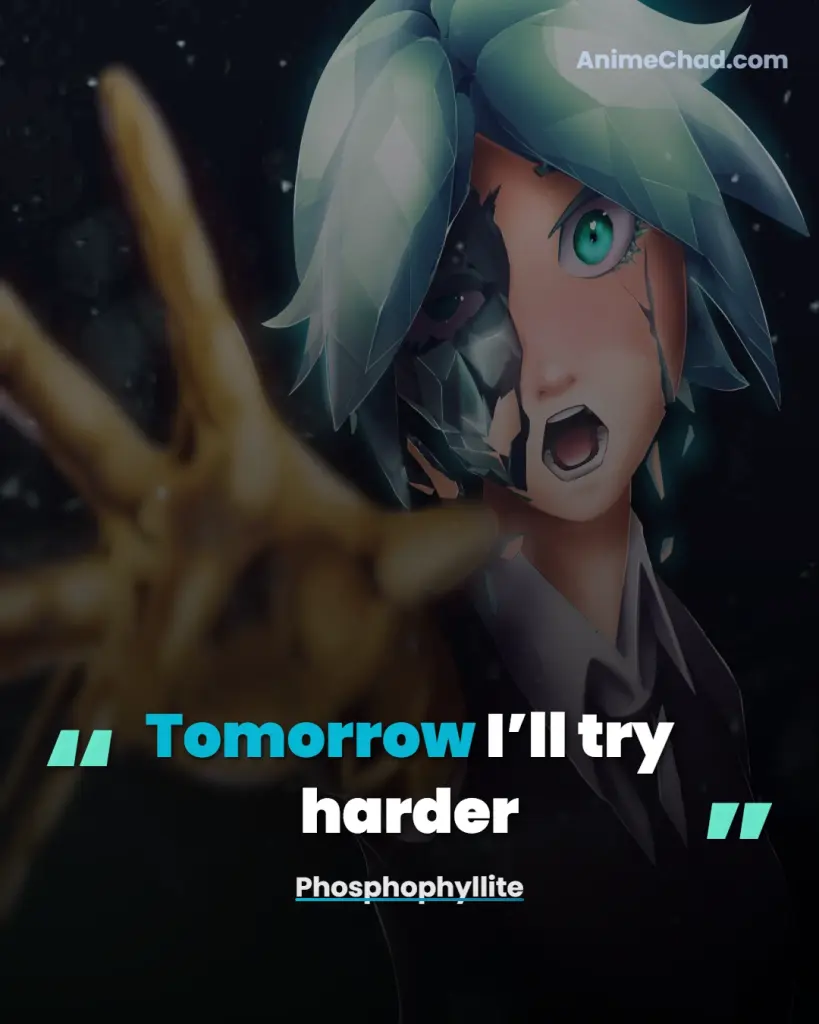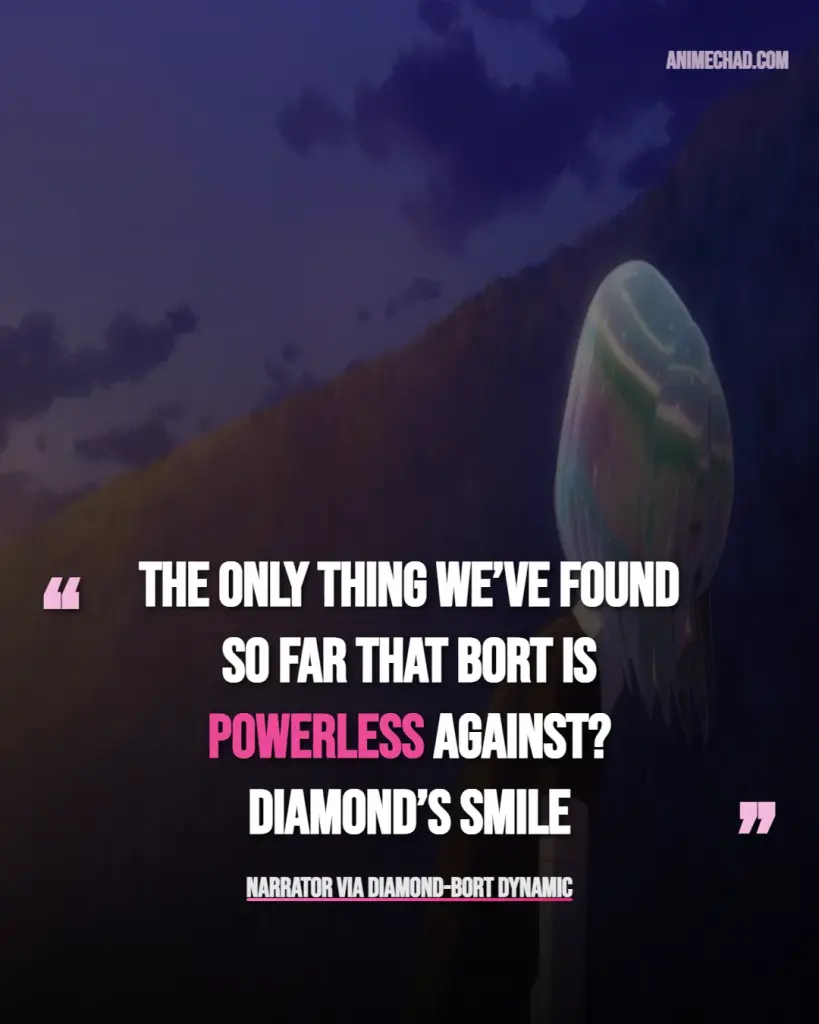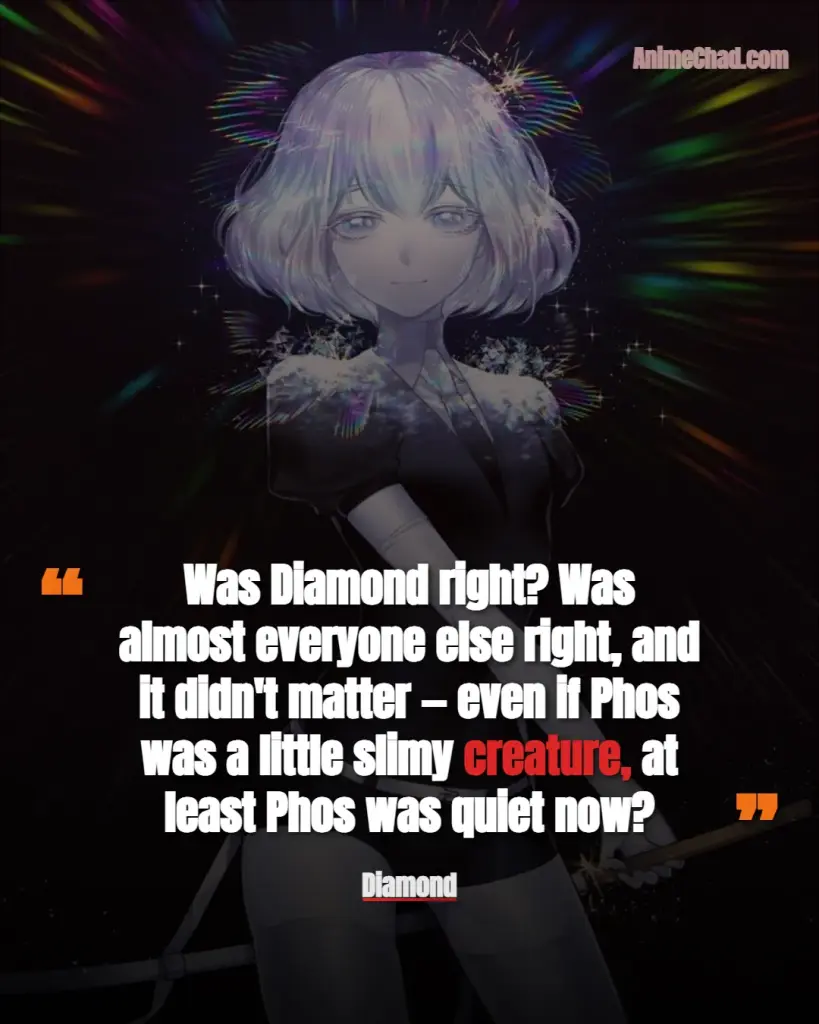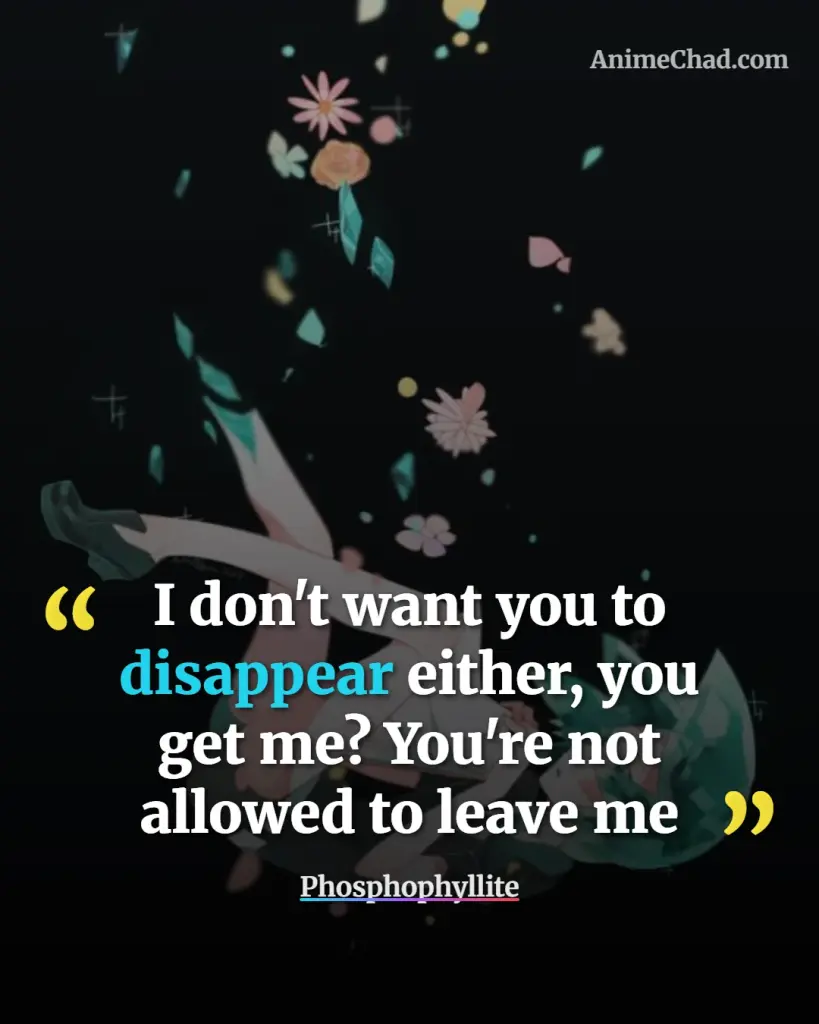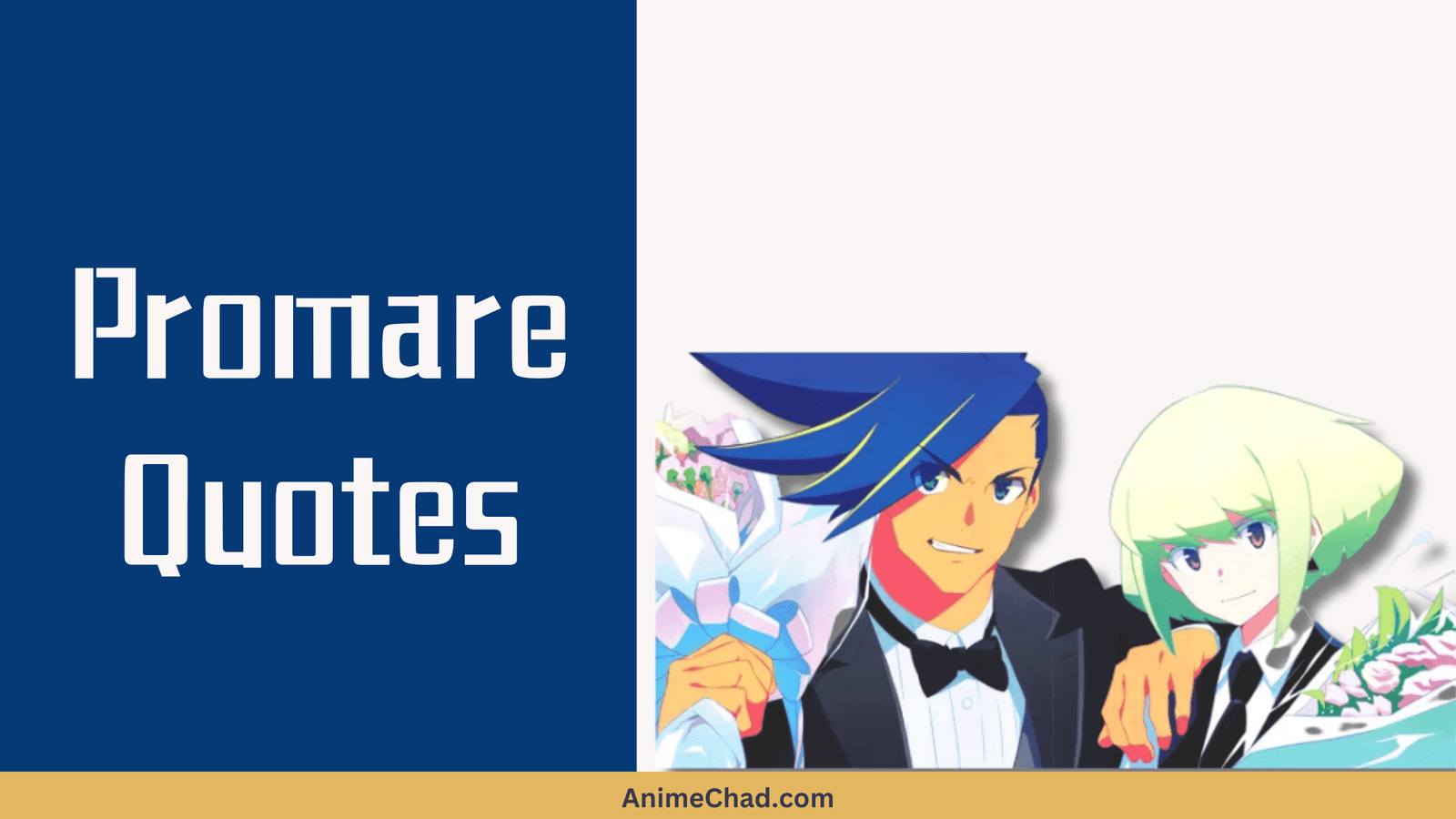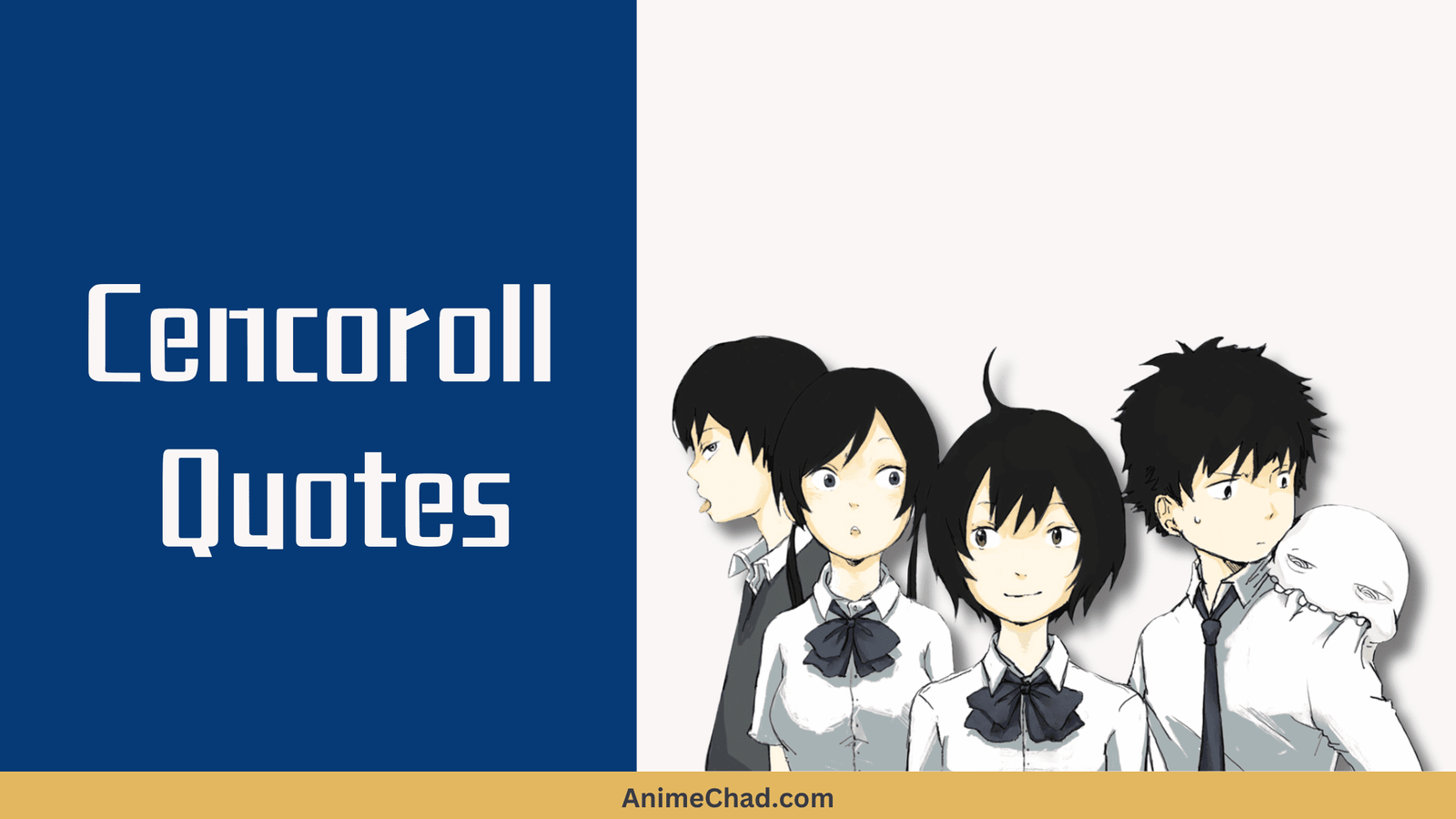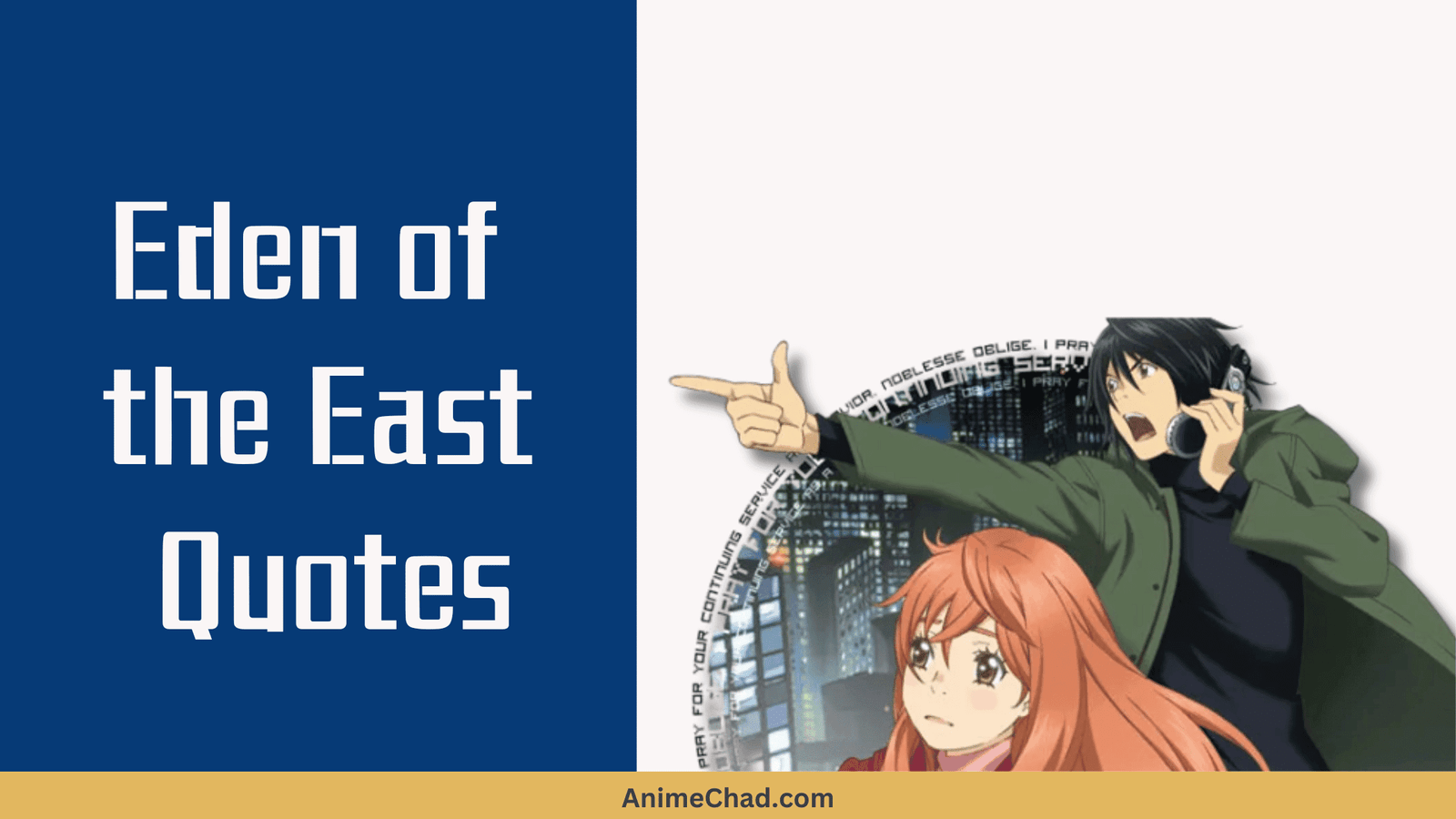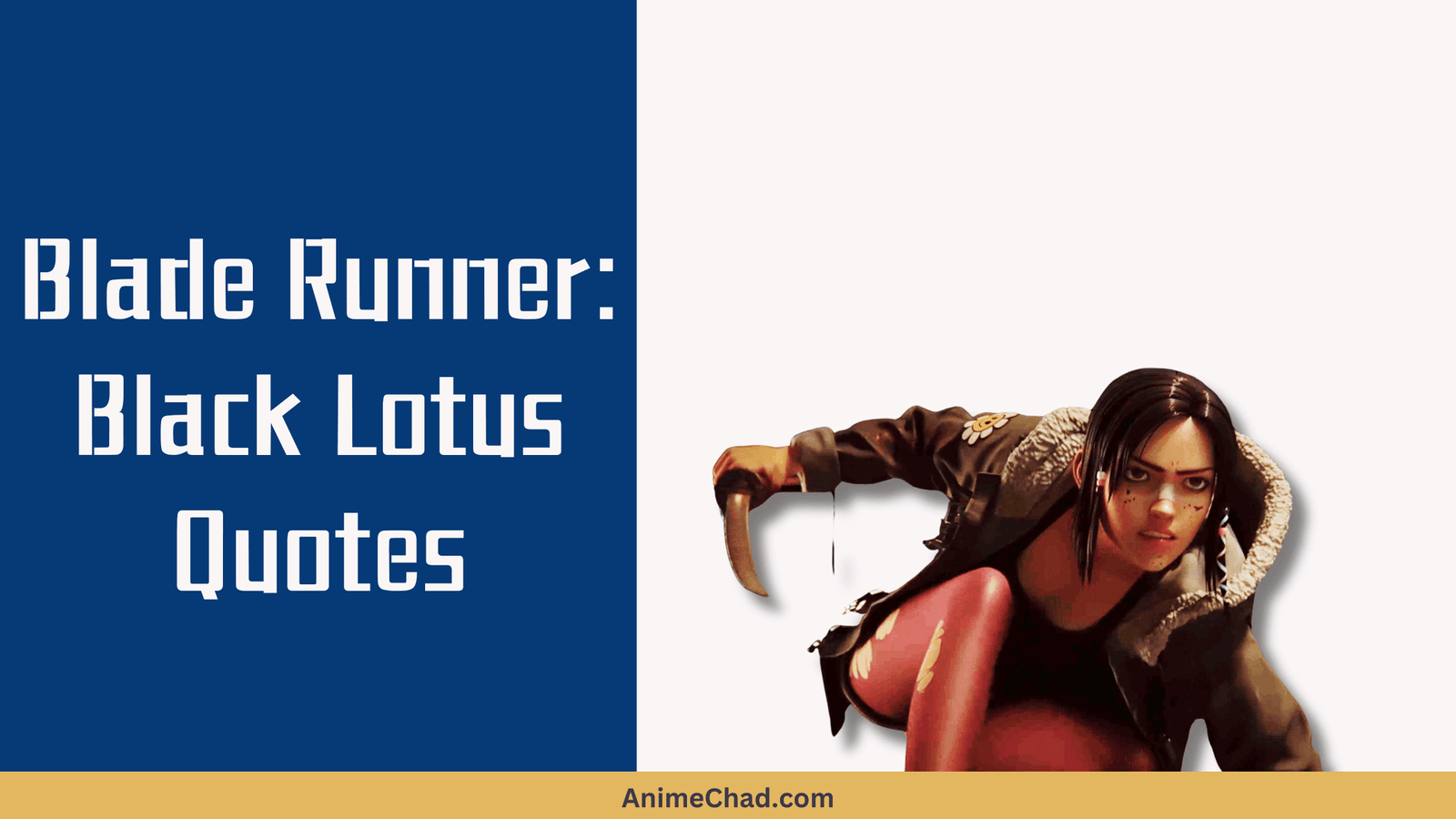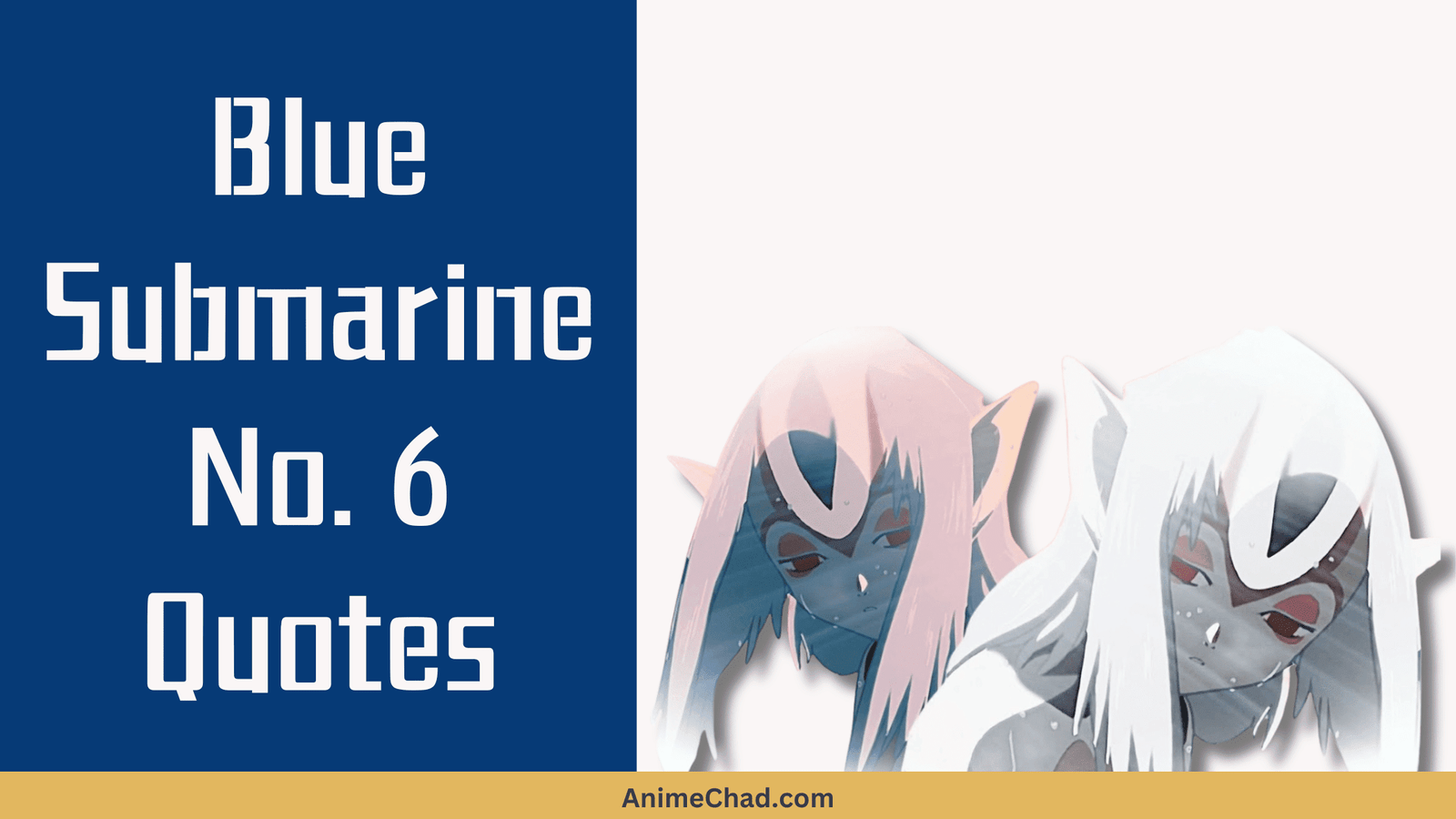Land of the Lustrous (Houseki no Kuni) is a captivating anime series from 2017, centered on Phosphophyllite (Phos), a fragile gem seeking purpose among immortal gem beings who defend against mysterious Lunarians. It explores profound themes of identity, transformation, loneliness, vengeance, and the burdens of immortality.
This curated collection of 25 canonical quotes from the anime and manga highlights emotional depth, character evolution, and philosophical connections, blending intense battle moments with reflective peaceful scenes across various story arcs.
I’m glad we broke up. The distance helps me see how much you mean to me
(Volume 4)
Phosphophyllite
Phos reflects on separation’s pain, marking growth in understanding emotional bonds amid themes of loss and change.
To come to acceptance with things and feelings is rare and to accept them completely is a miracle. It’s impossible to make that moment come faster by yourself. Someday it comes unexpectedly. In order to not become warped or heartless, let it go in a natural way. Let yourself feel sad when you are, and let yourself forget when you do
(Volume 6)
Haruko Ichikawa (narrator via gem philosophy)
This peaceful introspection on grief aids Phos’s development, tying into immortality’s emotional toll and acceptance.
Power always comes with a measure of loneliness
(Volume 4)
Bort
During a quiet moment of reflection, Bort reveals vulnerability, emphasizing isolation in strength and character depth.
Being clever sometimes makes it impossible to take action
(Volume 5)
Cinnabar
Cinnabar’s battle hesitation underscores self-doubt, fostering growth in confidence and themes of inaction’s paralysis.
I think about the Lunarians every day. To make sure my hatred stays fresh
(Volume 5)
Phosphophyllite
Phos’s vengeful resolve in combat highlights shifting from fragility to hardened purpose, connecting to revenge themes.
I can only do the things I can do. – Because you only try things you can do
(Volume 3)
Sensei (Kongou)
In a mentoring scene, this pushes Phos’s limits, symbolizing early development and the struggle for meaning.
The most human emotion is vengeance
(Volume 11)
Aechmea
Amid late-arc confrontations, this fuels Phos’s rage, illustrating humanity’s corruption in immortal beings.
Does that not break your heart? – Well… If it’s true, I might sort of feel bad for you, but… I dunno
(Volume 2)
Cinnabar and Phosphophyllite
A poignant exchange reveals empathy gaps, advancing Cinnabar’s isolation and themes of emotional disconnection.
Walk until you can’t. Then walk some more
(Volume 3)
Antarcticite
During Phos’s training ordeal, this embodies perseverance, marking physical and mental transformation.
I’m looking for a way to erase my existence
(Volume 13)
Phosphophyllite
In a despairing climax, Phos confronts identity loss, evoking profound sorrow and immortality’s existential weight.
The most human of all emotions is the thirst for revenge
(Volume 11)
Aechmea
Echoing battle fury, this deepens Phos’s arc toward vengeance, exploring humanity’s dark allure for gems.
Once you’ve crossed the bridge, burn it
(Volume 12)
Phosphophyllite
Phos’s ruthless decision in conflict signifies irreversible change, highlighting themes of sacrifice and evolution.
I’m a little scared because I’m more fragile than everyone else
(Volume 1)
Phosphophyllite
Early vulnerability exposes Phos’s insecurity, initiating growth from weakness to resilience amid loneliness.
But maybe I’ll wait a little longer before calling you a liar
(Volume 5)
Cinnabar
In a tentative alliance, this conveys fragile hope, developing Cinnabar’s trust issues and connection themes.
Let’s go shatter sensei into pieces! Right now! I don’t want sensei to be lonely
(Episode 12: New Work)
Phosphophyllite
Phos’s desperate outcry in finale turmoil reveals distorted loyalty, tying to betrayal and emotional fragmentation.
To come to acceptance with things and feelings is rare, and to accept and embrace them completely is a miracle
(Volume 6)
Haruko Ichikawa (narrator via gem philosophy)
Peaceful wisdom aids healing, reflecting character acceptance and immortality’s miraculous emotional shifts.
Promise me, you’ll never lose a shard
(From manga fanfiction context, but canonical echo in Volume 3)
Antarcticite
Battle loss evokes shattering grief, advancing Phos’s trauma and themes of impermanence.
I want to discover the world with you
(Volume 4)
Phosphophyllite
Exploratory peace with allies fosters bonds, showing Phos’s shift from isolation to communal purpose.
So what if you’re different? It’s our job to accept you, not your job to change
(Volume 2)
Diamond
Supportive words during integration highlight acceptance, developing themes of diversity in immortal society.
Who…. You certainly are one beautiful gem
(Volume 3)
Padparadscha
Awakening moment stirs wonder, connecting to beauty’s fleeting nature and character rediscovery.
This is all my…
(Episode 5: Return)
Cinnabar
Interrupted guilt in rescue scene exposes self-blame, deepening loneliness and relational growth.
Tomorrow I’ll try harder
(Episode 5: Return)
Phosphophyllite
Post-trauma resolve carries exhaustion’s weight, illustrating relentless pursuit of strength.
The only thing we’ve found so far that Bort is powerless against? Diamond’s smile
(Episode 3: Metamorphose)
Narrator via Diamond-Bort dynamic
Joyful vulnerability in peace contrasts battles, revealing emotional layers in stoic characters.
Was Diamond right? Was almost everyone else right, and it didn’t matter — even if Phos was a little slimy creature, at least Phos was quiet now?
(Episode 3: Metamorphose)
Diamond
Desperate search evokes abandonment fears, tying to themes of worth and communal rejection.
I don’t want you to disappear either, you get me? You’re not allowed to leave me
(Volume 3)
Phosphophyllite
Clinging plea in parting amplifies loss’s pain, advancing attachment and immortality’s cruel endurance.

